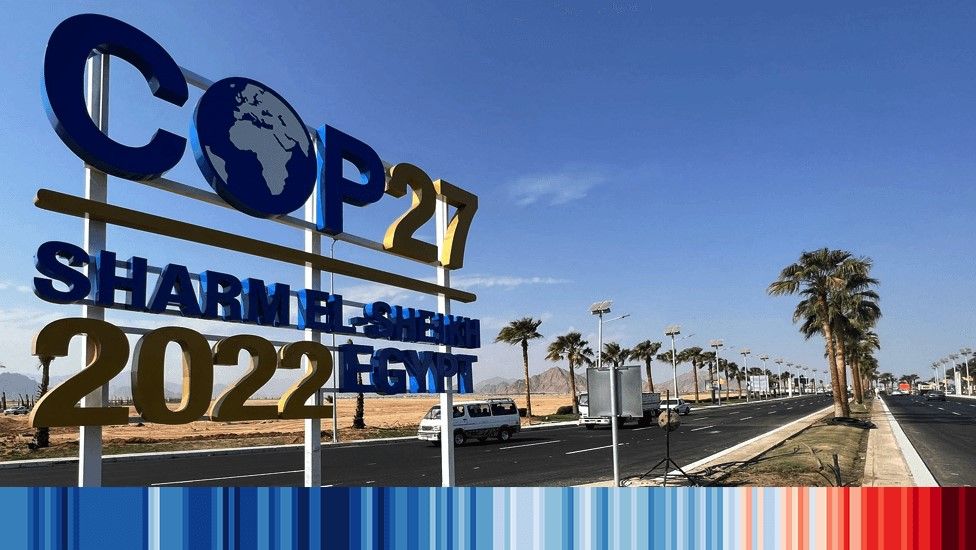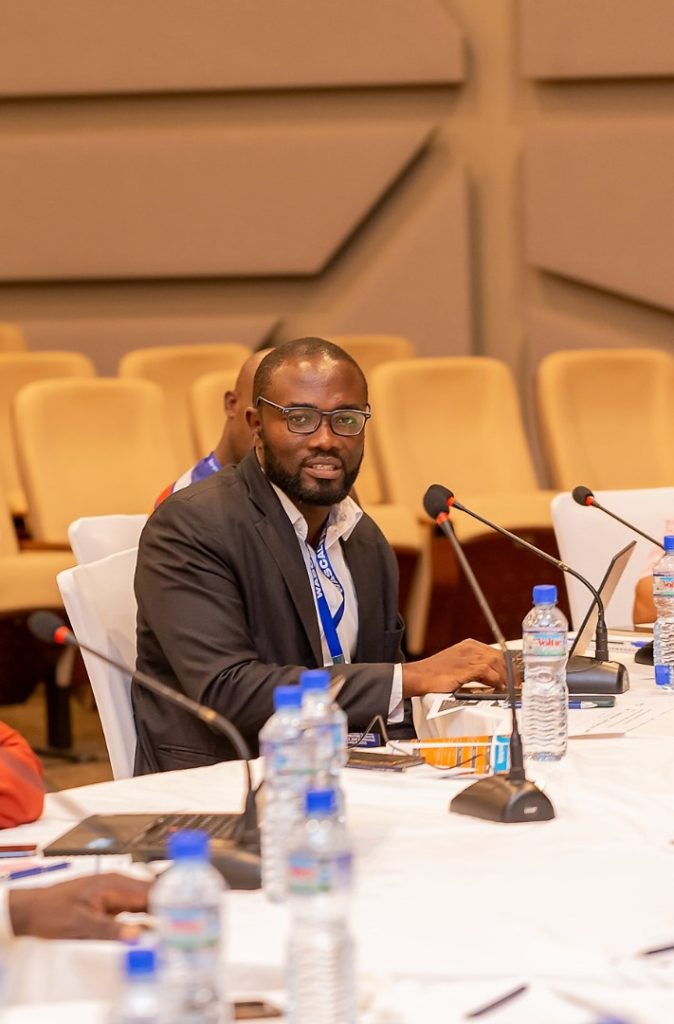By Nii Commey
Egypt, Nov. 7, GNA – The curtains are raised, and the stage is set in Egypt’s Sharm el-Sheik for the Conference of Parties 27 (COP27), as both state and non-state actors, globally, get devoted to deepening their resolve to scale up their conflict against the common antagonist (climate change) in the spirit of the commitment made at the Paris Agreement in 2015 and the pledge made in Copenhagen in 2009.
Inarguably the grandest global conference on the United Nation’s Sustainable Development Goal 13 on Climate Action, COP 27 will, at the end of the conference, measure and review the milestones of parties’ progress on the goal of climate finance between the developed and the least developed countries, the Nationally Determined Contributions (NDCs), which is basically the efforts by each country to reduce national emissions and adapt to the impacts of climate change, and several other discussions on green hydrogen, and global warming.
Empirically, tens of thousands of scientists and researchers across the world have discovered that the adverse repercussions of climate change have moved at a faster pace than they had forecast.
The findings have been intriguing; the discoveries have been phenomenal; research approach has been zealous; the data is there to prove. But paradoxically, the response rate has been slow; actions by society have been lethargic; the indifferent posture by the powers expected to act has been alarming.
While there are those who are skeptical about the whole happenings of climate change, there are audience who have not shown concern because they cannot relate to the whole phenomenon. That is not to discredit the monumental efforts that are put in daily across the world to fight this common enemy form all fronts.

Doing things differently
COP 27 presents us with another opportunity to advance the conversations in a more practical manner.
Simon Stiell, the new Executive Secretary of UNFCCC was emphatic in his opening address at COP27, begins “ a new era to do things differently “. And indeed, the chants in the chat box by the scores of virtual participants on Linkedin, with the words “take action now, and reduce the talk” were enough to conclude that a new era to do things differently was needed.
The world would want to see more action because whatever the case, climate change is still ongoing. Daily! It keeps corroding the very livelihoods of humanity- from health to agric, and from erratic weather patterns to water bodies.
With more than 196 countries committed to fighting this cause ‘chorusly’, I am convinced that the battle will be won. Eventually! With a concerted effort!
From my lenses as a storyteller
I strongly recommend the power of storytelling as a tool to champion the cause against climate change. It has been proven that the storytelling tool is so powerful in changing behaviours, influencing attitudes, building confidence, shaping thoughts, instigating change, drawing emotional attachment to values, causes, history, and beliefs.

Let me attempt to define storytelling. In short, storytelling is the detailed narration of thoughts, beliefs, personal experiences, and life- lessons through stories or narratives that evoke powerful emotions and insights.
So, when we talk about climate story, we mean a personal interpretation of climate change from our experiences and observations, ranging from hopelessness to optimism, from loss to determination.
It is descriptive and makes an emotional connection to climate change. Everybody loves stories. Primarily, we all grew up relishing the stories told us by our elders, and teachers. Beyond the education, communication and the information value they possess, stories are usually shrouded in the overall of engaging moments of exciting, relatable characters, and human involvement, with exciting narratives that sustain the interest of those consuming those stories.
The narrative of climate change, I think, has not hit the “soul” of all who matter, in spite of the efforts by some actors to drum home the message of climate change.
The story of climate change is largely a human one. And if stories can evoke emotions and influence humans, then the time to use storytelling in the fight against this global security threat is now.
Undeniably, understanding the issues of climate change can be complex. For instance, explaining jargons like “greenhouse emissions” “fossil fuels” “Coal Mine Methane”, “enhanced greenhouse effects etc” can be quite herculean to non-scientists, and, the consequences will be conspicuous apathy and abstract messaging.
A strong consideration to employ the use of stories in West Africa will go a long way to add a human touch to the hard facts and statistics garnered over the years. The story of climate change ought to be told in a manner that will evoke the emotional sensibilities of everyone.
Through storytelling, chances are that the consumers of the story will tend to embrace the problem, understand the stakes, and identify sources of tension.
What storytelling can do for climate change
Firstly, intensifying storytelling will go a long way help in gaining a better understanding of climate change. We consume stories daily. Everybody loves stories. The elements involved in storytelling, like creating heroes, villains, conflicts, suspense, and resolutions all help to sustain our interest and help us understand the story better.
Whereas facts and findings make us aware of the issues, it takes stories to understand and appreciate the gravity of the findings. We cannot take out storytelling out of the climate change equation
Secondly, there is the need to consider storytelling because it goes a long way to help in communicating the complexities of climate change in very simple ways.
Stories constitute the single most powerful weapon in a leader’s arsenal. The most powerful person in the world is the storyteller. He sets the vision, values and agenda of an entire generation that is to come. There is nothing so assimilating and transformative like storytelling communication. And global leaders cannot be oblivious of this tool. So much is going on. But the story needs to be told
Thirdly, storytelling promotes bonding amongst groups of people. Through storytelling, the connection, rapport building, and trust establishment are enhanced. Everybody loves stories, irrespective of their social standing. Everybody consumes stories daily. So with the right storytelling strategies, all the deliberations, dialogues, agreements, and discussions at the highest level at COP27 can come to life, and can be cascaded down, to debunk the erroneous impression created that climate change is the responsibilities of scientists, and their policy makers to figure things out.
Climate change is for the farmer. It is for the industries, the drivers, the fisherfolks. It is for students, market women, for the politician, for the corporate environment, and storytelling is one of the surest ways to reach out to all these people to embrace this global crisis.
In a nutshell…
Research shows that stories are remembered up to 22 times more than facts alone.” When people think of advocating for their ideas, they think of convincing arguments based on data, facts, and figures. However, studies show that if you share a story, people are often more likely to be persuaded.
So, while least developed countries make claims for the pledged climate financing by the developed countries, they should be considering a massive storytelling campaign vis visa the real work on the ground.
I believe parties should have campaign strategies to tell the stories will advise that all parties make the intentional efforts to allocate some funding for storytelling campaigns. I know its effective, and if we want to rally everyone along this fight, then we ought to tell them the story for a better appreciation. It is a new era, and I hope it surely will bring about doing things differently.
The story must be told
So that when in the days ahead we are old
Or been called to our eternal place of gold
Posterity will not accuse us of accumulating wealth
And leaving them a deleted inhabitable earth
GNA
Nii Commey is the Public Relations Manager of West African Science Service Centre on Climate Change and Adapted Land Use (WASCAL).
He is participating in COP 27 currently underway in Egypt.